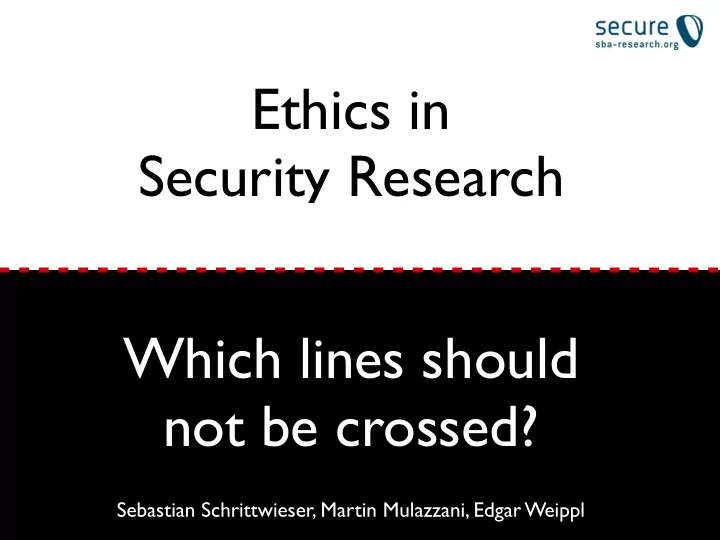

Ethics in Security Research Which lines should not be crossed? Sebastian Schrittwieser, Martin Mulazzani, Edgar Weippl
Ideas of this talk ‣ Proposal of fundamental ethical principles ‣ Analysis of their role in recent papers ‣ Discussion - no judgement!
Ethical Principles
Do not harm humans actively!
‣ Patients were not informed about available treatments ‣ No precautions were taken that patients did not infect others ‣ They were also actively given false information regarding treatment Tuskegee syphilis experiment
‣ Patients were not informed about available treatments ‣ No precautions were taken that patients did not infect others ‣ They were also actively given false information regarding treatment
InfoSec research: What could possibly go wrong?
‣ Hoax ad on Craigslist ‣ Sexually explicit ad posted as a woman ‣ More than 100 men responded ‣ Their names, pictures, e-mail and phone numbers were published ‣ Possible results: divorces, firings, lawsuits, etc.
‣ Hoax ad on Craigslist ‣ Sexually explicit ad posted as a woman ‣ More than 100 men responded ‣ Their names, pictures, e-mail and phone numbers were published ‣ Possible results: divorces, firings, lawsuits, etc.
Do not watch bad things happening!
‣ “passive actors” - Watching without helping - The researchs knew which computers were infected and simply watched without taking actions ‣ Analogy - Observing muggers at a backstreet without calling the police?
‣ “passive actors” - Watching without helping - The researchs knew which computers were infected and simply watched without taking actions ‣ Analogy - Observing muggers at a backstreet without calling the police?
‣ “damage to victims [...] would be minimized” - Victims were only informed after the experiments - Again: watching without helping
Do not perform illegal activities to harm illegal activities!
‣ Intercepting a “legal botnet” (SETI@home) would be unethical ‣ Is a similar activity ethical simply because it is aimed at “bad” people? ‣ No argument of self-defense can be made!
‣ Intercepting a “legal botnet” (SETI@home) would be unethical ‣ Is a similar activity ethical simply because it is aimed at “bad” people? ‣ No argument of self-defense can be made!
‣ “some [...] contents have already been widely and publicly documented. Consequently, we cannot create any new harm simply through association with these entities or repeating these findings” ‣ Argument: everyone does it that way…
Do not conduct undercover research!
‣ “we believe that realistic experiments are the only way to reliably estimate success rates of attacks in the real-world” ‣ We had to do it that way... ‣ Does not solve the ethical dilemma!
‣ “we believe that realistic experiments are the only way to reliably estimate success rates of attacks in the real-world” ‣ We had to do it that way... ‣ Does not solve the ethical dilemma!
Conclusions
‣ InfoSec research community is well aware of ethical questions within their field ‣ However, even the most fundamental ethical principles are difficult to fulfill ‣ Things are changing fast in information technology. Threat of guidelines that do not reflect the actual technological environment?
Thank you for your attention! sschrittwieser@sba-research.org
Recommend
More recommend